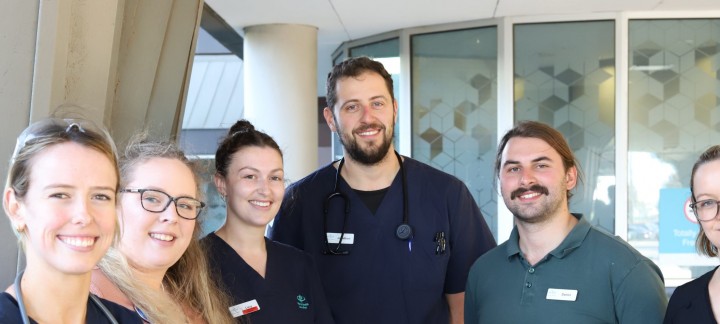Standing alongside our doctors, nurses and midwives on the COVID-19 frontline is a team of health professionals that is integral to patients safely returning home.
They are our Mercy Health allied health workforce — a team that former Werribee Mercy Hospital patient Robert Pike leaned on in his recovery from COVID-19 last year.
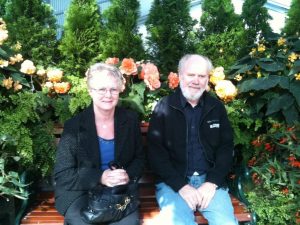
Werribee Mercy Hospital patient Robert Pike and his sister Noelle Fenn.
Robert was taken to Werribee Mercy Hospital fighting for life in September 2020, when Victoria was deeply immersed in the state’s second COVID-19 wave. He remembers little about those terrifying few weeks, but for his sister Noelle Fenn, the memories are vivid.
“When he got to the hospital he was only in the Emergency Department for half an hour before they took him to the intensive care unit (ICU),” Noelle says. “The nurse called me and asked if they could intubate him.
“They were wonderful. He was in ICU for a fortnight and after that he was on the ward for two weeks, where he had all sorts of treatments.”
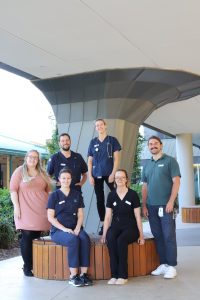
The Mercy Health Allied Health team takes a collaborative approach to care and is made up of about 30 disciplines, including physiotherapists, speech therapists, dietitians, occupational therapists and social workers.
As is often the case, patients who are intubated (where a tube is inserted through mouth into the airways) need help with their speech and swallowing once the tube is removed. Robert needed speech therapy as part of his recovery — and physiotherapy, dietetics, social work, pastoral care and occupational therapy — all from the Mercy Health allied health team.
“When he was moved from ICU to the ward he took a while to gain any strength,” Noelle recalls. “The physiotherapists had to teach him how to walk again and they worked on his chest each day to help him with his breathing. I remember that I couldn’t hear him when he tried to speak to me, so the speech therapists helped with his voice.
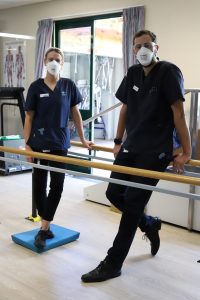
Physiotherapists Kathleen McLaughlin and Jonathan Edgley help COVID-19 patients regain strength in their legs after prolonged periods of bed rest.
“We couldn’t complain about anything. They (the social workers) rang me every day and so did the doctors and nurses, and they organised for us to have video chats, which was very special because we saw him improving. We were supported too because no one was allowed to visit, which was very hard.
“Robert doesn’t remember a lot about what happened during that time, but I know he is very thankful.”
Tomecka McPhail is one of Werribee Mercy Hospital’s acute social workers. She says it takes a whole team to help patients leave hospital safely.
Patients don’t get out of hospital without some form of input from allied health.
Allied health is a collective term that refers to tertiary qualified healthcare professionals who are not doctors, nurses or midwives.
“We look at the physical, social, practical, emotional and spiritual aspects of a person,” Tomecka explains. “In a hospital setting, we are here to ensure that a patient can be safely discharged. That might include social work, dietetics, occupational therapy, podiatry, psychology, pastoral care, speech therapy, pharmacy and a whole lot more.”
As a COVID-19 streaming hospital, the role of Werribee Mercy Hospital social workers like Tomecka was crucial at the height of the pandemic.
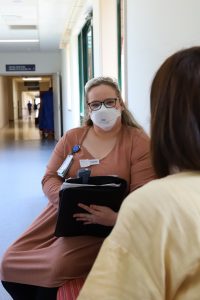
Social Worker Tomecka McPhail prepares her client for a safe return home.
“COVID-19 presents great challenges,” Tomecka says. “With visitor restrictions in the hospital, and border closures preventing people from coming in, we were often supporting families of COVID-19 patients. We were the middle people, facilitating contact with their loved ones, providing emotional and practical support. We were there at end of life, and were the eyes for the family members, making sure that their loved ones were at peace and comfortable. Our physiotherapists helped those who had lost condition to gain strength and our speech therapists and dietitians and occupational therapists all play a huge part in helping people while they are in hospital to return to living independent lives once they go home, whether they are COVID-19 patients or not.
“It’s been an extraordinary time for allied health workers on the frontline.”
Allied Health Acting Director Leanne Foster sums up the holistic role of hospital allied health workers best of all: “Patients don’t get out of hospital without some form of input from allied health,” she says.
More than 12 months on from his COVID-19 diagnosis, Robert is now back on his feet, and has built up to walking a lap of the floor six times a day, at the residential aged care home where he lives.
“I was unconscious for a week and a half, but I pulled through,” Robert says. “I’m healthy again, almost back to normal, I just get puffed out easier. But I feel very, very lucky.”



